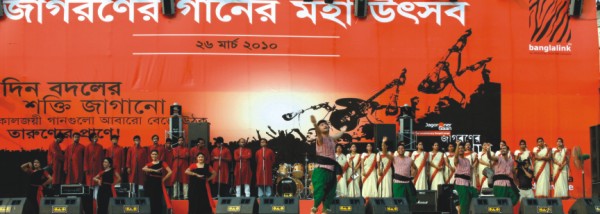|
Musings
Jagoroner Gaan
Shudeepto Ariquzzaman

Music has provided inspiration to countless Bengali patriots in their struggle against British imperialism and later Pakistani oppression. Music occupies a special place in the history of Bangladesh's struggle for identity and independence. “Jagoran Shangsthritikcharcha O Gobeshona Kendra” sponsored by Banglalink has taken the initiative for preserving songs that are an integral part of the Bengali's struggles. The first of these endeavours is “ Jagoroner Gaan”, a compilation of six compact disks attempting to bring a selection of 71 timeless Bengali compositions that have withstood the test of time. The songs are a reflection of the revolutionary spirit that music has managed to install within the Bengalis in their heroic quest for freedom and justice.
To day Bengalis have an independent state called Bangladesh. Regardless of all shortcomings, being Bengali means something special. The British Empire and Pakistani misrule are now history. However, it was not always like this. There was a time when an inferiority complex and identity crisis was prevalent among the Bengali community. Music also defined the cultural identity of the Bengalis and installed a sense of pride and self-respect that was missing among the Bengalis for many generations.
By the beginning of the 19th century, British rule was firmly consolidated across the Indian subcontinent especially in Bengal and was welcomed by most Bengalis who were happy to see the backs of the Nawabs. British imperialism was accompanied with awe and admiration for the white man. The very notion that Bengalis could wrest control from the British or any foreign power and rule themselves was unthinkable as it was laughable. Bengali elites, especially based in Calcutta, were busy replicating the English culture. Bengali was not even considered a language where any intelligent being could express their feelings in writing or through speech.
This was about to change. An intellectual movement was taking hold across Bengal that would dramatically enrich Bengali literature and music while changing popular perception of Bengali language and culture. During these times, many songs were composed that endowed Bengalis with feelings of patriotism and love for the motherland. Ravindranath Tagore's Amar Shonar Bangla became popular among Bengalis. The song that later went to become the national anthem of Bangladesh mirrors the adoration Bengalis have for their motherland. Previously such emotions were more or less absent among Bengalis.
Bengalis were destined to play a vital role in the independence movement for both India and Pakistan and Bengali revolutionary music would provide inspiration for numerous patriots like them.
Following World War II the British found themselves unable to hold on to India. In 1947 the Empire was divided into two countries, India and Pakistan with East Bengal incorporated into Pakistan, and West Bengal into India. Differences soon simmered in Pakistan between the Bengali majority and West Pakistanis. The clash was primarily cultural as the ruling elite made up primarily of Punjabis tried to impose Urdu as the national language of Pakistan.
As it became clearer that Pakistan was not interested in accommodating Bengalis, protests flared up ultimately resulting in the liberation struggle of 1971. The tune of Bengali music provided encouragement for the Bengali and accordingly Pakistanis hated these songs. Songs like Shuno Ekti Mujiborer speaks the language of the street, endorsing Sheikh Mujibor Rahman as the leader of the Bengali masses. There were several attempts by the government to ban many Bengali songs, including Tagore songs on the flimsy excuse that they were Indian propaganda. But it was too late to deprive Bengalis from their cultural heritage.
During 1971, freedom fighters drew inspiration from music as they went into battle. Women and children risked their lives to listen to Bengali music that was banned by the Pakistani military. Revolutionary music such as Joy Bangla Banglar Joy and Purbo Digante Shurjo Utheche has become more or less identical with the liberation struggle of 1971. Even now when we remember the days of 1971, lyrics of patriotic songs play in our minds, songs that provided courage and determination in those fateful months and inspired countless Bengalis to lay down their lives for the state called Bangladesh. Jagoroner gaan is the first initiative to preserve songs that will provide inspiration to future generations.
Copyright
(R) thedailystar.net 2010
|

